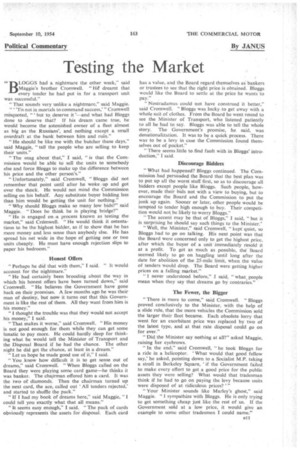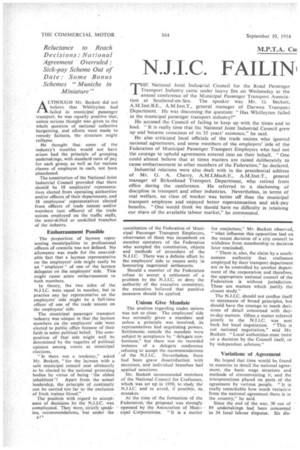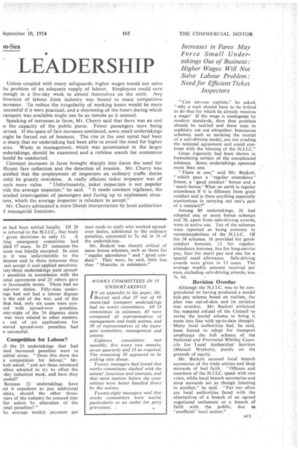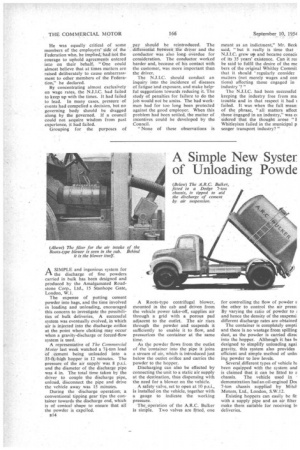Testing the Market
Page 45

Page 46

Page 47

Page 48

If you've noticed an error in this article please click here to report it so we can fix it.
B 44 LOGOS had a nightmare the other week," said
Maggie's brother Cromwell. "H dreamt that every tender he had put in for a transport unit was successful."
" That sounds very unlike a nightmare," said Maggie.
"''Tis not in mortals to command success,'" Cromwell misquoted, " ' but to deserve it '—and what had Bloggs done to deserve that? If his dream came true, he would become the astonished owner of a fleet almost as big as the Russians', and nothing except a small overdraft at the bank between him and ruin."
"He should be like me with the butcher these days," said Maggie, "tell the people who are selling to keep their units."
"The snag about 'that," I said, "is that the Commission would be .able = to sell the units to somebody else and force Bloggs to make up the difference between his price and the other person's."
"Unfortunately," said Cromwell, "Bloggs did not remember that point until after he woke -up and got over the shock. He would not mind the Commission selling on his behalf. Any substitute buyer bidding less than him would be getting the unit for nothing."
"Why should Bloggs make so many low bids?" said Maggie. "Does he think he is playing bridge?"
"He is engaged on a process known as testing the market," said Cromwell. "He would think it ostentatious to be the highest bidder, as if to show that he has more money and less sense than anybody else. He has spread his net wide in the hope of getting one or two units cheaply. He must have enough rejection slips to paper his bedroom." .
Honest Offers
"Perhaps he did that with them," I said. " It would account for the nightmare." .
"He had certainly been brooding about the way in which his honest offers have been turned down," said Cromwell. "He believes the Government have gone back on their promises. A few months ago he was their man of destiny, but now it turns out that this Government is like the rest of them. All they want from him is his money."
"I thought the trouble was that the would not accept his money," I said.
"That makes. it worse," said Cromwell. "His money is not good enough for them while they can get some lunatic to pay more. He could hardly sleep for thinking what he would tell the Minister of Transport and the Disposal Board if he had the chance. The other night he did get the chance, at least in a dream."
"Let us hope he made good use of it," I said.
"You know how difficult it is to get sense out of dreams," said Cromwell. "When Bloggs. called on the Board they were playing some card game—he thinks it was banker. The chairman offered him a card. It was the two of diamonds. Then the chairman turned up the next card, the ace, called out ' All tenders rejected,' and started to shuffle the pack."
"If I had my book of dreams here," said Maggie, "I
could tell you exactly what that all means." . "It seems easy enough," I said. "The pack of cards obviously represents the assets for disposal. Each card has a value, and the Board regard themselves as bankers or trustees to see that the right price is obtained. Bloggs would like the Board to settle at the price he wants to pay."
" Nostradamus could not have construed it better," said Cromwell. "Bloggs was lucky. to get away with a whole suit of clothes. From the Board he went round to see the Minister of Transport, who listened patiently to all he had to say. Bloggs was able to tell the whole story. The Government's promise, he said, was denationalization. It was to be a quick process. There was to be a levy in case the Commission found themselves out of pocket."
"There seems little to find fault with in Bloggs.' introduction," I said.
Discourage Bidders
"What had happened? Bloggs continued. The Cornmission had persuaded the Board that the best plan was to put up all the worst stuff first, so as to discourage all bidders except people like Bloggs. Such people, however, made their bids not with a view to buying, but to encourage the Board and the Commission to put the junk up again. Sooner or later, other people would be tempted to tender high enough to buy. Their competition would not be likely to worry Bloggs."
"The accent may be that of Bloggs," I said, "but it is surprising he should say such things to the Minister:'
"Well, the Minister," said Cromwell, "kept quiet, so Bloggs had to go on talking. His next point was that the Board were concerned only to get the highest price, after which the buyer of a unit immediately resold it at a profit. To get as much as possible, the Board seemed likely to go on haggling until long after the date for abolition of the 25-mde limit, when the Value of tenders would drop. The Board were getting higher prices on a falling market."
"I never understood before," I said, "what people mean when they say that dreams go by contraries."
The Fewer, the Bigger
"There is more to come," said Cromwell. "Bloggs proved conclusively to the Minister, with the help of a slide rule, that the more vehicles the Commission sold the larger their fleet became. Each obsolete lorry that went for an exorbitant price was replaced by two of the latest type, and at that rate disposal could go on for ever."
"Did the Minister say nothing at all?" asked Maggie, raising her eyebrows.
" In the end," said Cromwell, "he took Bloggs for a ride in a helicopter. What would that good fellow say,' he asked, pointing down to a Socialist M.P. taking a stroll in Berkeley Square, if the Government failed to make every effort to get a good price for the public assets they were selling? What would that tradesman think if he had to go on paying the levy because units were disposed of at ridiculous prices? "
"Your Minister sounds like Marley's ghost," said Maggie. "I sympathize with Bloggs. He is only trying to get something cheap just like the rest of us. It the Government sold at a low price, it would give an example to some other tradesmen I could name."
ALTHOUGH Mr. Beckett did not
, believe that Whitleyisrn had tailed in municipal passenger transport, he as equally positive that, unless serious thought Was given to the whole question of national' collective bargaining, and efforts were made to remedy failures, the structure might collapse.
He thought that some of the industry's troubles would not have arisen had the principle of grouping undertakings, with standard rates of pay for each group, as well as for various classes of employee in each, not been abandoned.
The constitution of the National Joint Industrial Council provided that there should be 18 employers' representatives elected from operating authorities and/or officers of their departments, and 18 employees' representatives elected from officers of trade unions and/or members (not officers) of the trade unions employed on the traffic staffs, the semi-skilled or unskilled branches of the industry.
• Embarrassment Possible
The proportion of laymen representing municipalities to professional officers of councils was not defined. No allowance was made for the unavoidable fact that a layman representative on the employees' side might easily be an " employer " of one of the laymen delegates on the employers' side. This might cause acute embarrassment to both members.
In theory, the two sides of the N.J.I.C, were equal in number, but in practice any lay •representative on the employers' side might be a full-time officer of one of the trade unions on the employees' side.
The municipal passenger transport industry was unique in that the laymen members on the employers' side were elected to public office because of their faith in some political belief. The composition of that side might well be determined by the vagaries of political opinion among voters at municipal elections.
"Is there not a tendency," asked Mr. Beckett, "for the layman with a safe municipal council seat ultimately to be elected to the national governing bodies by virtue of being •` the oldest inhabitant '? Apart from the actual leadership, the principle of continuity can be carried too far to the exclusion ' of fresh trainee blood." •
The position With regard to acceptance of decisions by: the N.J.I.C. was complicated. They weres.strietlY speaking, recommendations, Nit under ' the is I 7
constitution of the Federation of Municipal Passenger Transport Employers, observance of them was incumbent on member operators of the Federation who accepted, the constitution, objects and methods of procedure of the N.J.I.C. • There was a definite effort by the employers' side to _ensure unity in honouring negotiated settlements.
Should a member of the Federation refuse to accept a settlement of a problem by the N.J.1.C. or deny the authority of the executive committee, the executive believed that punitive measures should be applied.
Unions Give Mandate
The position regarding trades unions was not so clear. The employees' side was normally given a mandate and unless a principle was involved, its representatives had negotiating powers. Settlements outside the mandate were subject to acceptance by " delegate conferences," but there was no recorded instance of a delegate conference refusing to accept the recommendations. of the N.J.I.C. Nevertheless, there had been grave dissatisfaction with decisions, and individual branches had applied sanctions.
Mr. Beckett recommended members of the National Council for Craftsmen, which was set up in 1950, to study the and to avoid, if possible, its mistakes.
At the time of the formationof the Federation, the proposal was .strongly opposed by the Association of Municipal Corporations. "It is a matter
for conjecture," Mr. Beckett observed, "what influence this opposition had on the recent decision of a city council to withdraw from membership (a decision later rescinded).
"There is, also, the claim by a southeastern authority that craftsmen employed by their transport department are to be controlled by another department of the corporation and therefore, the appropriate national council of the Federation is without jurisdiction. These are matters which justify the closest study."
The N.J.I.C, should not confine itself to statements of broad principles, but should have the courage to reach decisions of detail concerned with dayto-day matters. Often a matter referred jointly to the NJ.LC. was sent back for local negotiation. "This is not national negotiation," said Mr. 13eekett. " Local authorities must insist on a decision by the Council itself, or by independent arbitors."
Variations 'or Agreement
He hoped that time would be found to examine in detail the national agreement, the basic wage structure and methods of circumventing it, and the interpretations placed on parts of the agreement by various people. " It is really remarkable how much variation from the national agreement there is in the country," he said.
Since the end of the war, 30 out of 89 undertakings had been concerned in 34 local labour disputes. Six dis es had been settled locally. Of 28 rs referred to the N.J.T.C., that body given decisions in only 11. A ting emergency committee had ided 17 cases. In 25 instances the ision was loyally accepted. In nine it was unfavourable to the goyees and in three instances they not accept it and applied sanctions. ixty-three undertakings paid spread
✓ penalties in accordance with the ional agreement and 23 others gave re favourable terms. Three had no ad-over duties. Fifty-nine underings had not had a labour dispute :e the end of the war, and of the that had, only six cases were con
led with spread-over penalties. :My-eight of the 34 disputes since war were related to other matters.
e out of six applications for proved spread-over penalties had n successful.
Competition for Labour?
di the 23 undertakings that had nted increased penalties were in ustrial areas. "Does this show the
n competition for labour," Mr. kett asked, " and are these increased alties adopted to try to offset the -day industrial week, and have they .eded? •
Because 23 undertakings have ad it expedient to pay additional alties, should the other threerters of the industry, be coerced into ilar action by alteration of the onal penalties? "
he average weekly payment per
man made to staffs who worked spreadover duties, additional to the ordinary penalties, amounted to 7s. 6(1. in 16 of the undertakings.
Mr. Beckett was sharply critical of some bonus schemes, such as those for "regular attendance" and "good conduct." They were, he said, little less than " Munichs in miniature."
"Can anyone explain," he asked, "why a man should have to be bribed to do that for which he already receives a wage? If the wage is inadequate by modern standards, then that problem should be tackled and these sops to sophistry cut out altogether. Innocuous schemes, such as marking the receipt of a safe-driving medal, are not evading the national agreement and could continue with the blessing of the N.J.I.C."
Great ingenuity had been shown in formulating certain of the complicated schemes. Some undertakings operated more than one.
"There is One," said Mr. Beckett, " which pays a regular attendance' bonus, a good conduct' bonus and a 'merit bonus.' What on earth is regular attendance if it is different from good conduct and is there anything especially meritorious in carrying out one's part of a contract?"
Among 89 undertakings, 26 had adopted one or more bonus schemes and 38, apart from safe-driving awards, were in active use. Ten of the schemes were reported as being contrary to recommendations of the NJ.I.C. Of the 38 schemes, 16 provided for goodconduct bonuses, 12 for regularattendance bonuses, five for long-service pay, four for merit pay and one for a special meal allowance. Safe-driving awards were given in 13 cases. The average weekly amount received per man, excluding safe-driving awards, was 3s, 4d, 4 Revision Overdue Although the N.J.I.C. was to be congratulated on having produced a model sick-pay scheme based on realism, the plan was out-of-date and its revision was overdue. Mr. Beckett criticized the repeated refusal of the Council to revise the model scheme to bring it more into line with up-to-date thought. Many local authorities had, he said, been forced to adopt for transport employees the full scheme of the National and Provincial Whitley Councils for Local Authorities' Services (Manual Workers), purely on the grounds of equity.
Mr. Beckett accused local branch secretaries of the trade unions and Shop stewards of bad faith. "Officers and members of the N.J.I.C. speak with one voice, while local branch secretaries and shop stewards act as though listening to another," he said. "Far too often are local authorities faced with the alternatives of a breach of an agreed negotiated settlement or a breach of faith with the public, due to unofficial' local action."
He was equally critical of some members of the employers' side of the Federation who, he implied,l-had not the courage to uphold agreements entered into on their behalf. "One cauld almost believe that at times matters are raised deliberately to cause embarrassment to other members of the Federation," he declared.
By concentrating almost exclusively on wage rates, the NJ:1.C. had failed to keep up with the times. It had failed to lead. In many cases, pressure of events had compelled a decision, but no governing body should be dragged along by the governed. If a council could not acquire wisdom from past experience, it had failed.
Grouping for the purposes of pay should be reintroduced. The differential betWeen the driver and the conductor was also long overdue for consideration. The conductor worked harder and, because of his contact with the customer, was more important than the driver.
The Nile. should conduct an inquiry into the incidence of diseases of fatigue andexposure, and make helpful suggestions towards reducing it. The study of penalties for failure to do the job would not be amiss. The bad workman had for too long been protected against the good employer. When this problem had been settled, the matter of incentives could be developed by the Council, "None of these observations is meant as an indictment," Mr. Beck said, " but it really is time that N.J.I.C. grew up and became conseic of its 35 years' existence. Can it me be said to fulfil the desire of the me bers of the original Whitley Commit that it should regularly consider matters (not merely wages and con Lions) affecting those engaged in industry '? "
The N.J.I.C. had been successful keeping the industry free from ma trouble and in that respect it had failed. It was . when the full mean. of. the phrase, "all.' matters affect those engaged in an industry," was ci sidered that the thought arose " Whitleyism failed in the municipal p senger transport industry? "




















































































